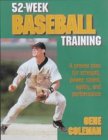|

Attracting the Attention
of
Pro and College Scouts
Gene Coleman - Houston Astros

There are five physical tools that pro and college scouts look for when evaluating baseball talent:
- The ability to hit
- The ability to hit with power
- Running speed
- Arm strength
- Fielding ability
While it's important to score high on most or all of these tools, physical attributes aren't the only factors that scouts look for.
They also look for intangibles like passion, enthusiasm, dedication and the ability to win.
They don't look for just one special quality. Speed, for example, is important, but it's not the sole requisite for success in baseball. A baseball game is not a track meet. Often time players with pure speed don't know how to use it between the lines. They're fast, but they can't steal a base, read a fly ball or change directions. They're one-dimensional players, they can run fast, but they don't know how to use their speed.
Getting noticed and becoming a better player are two different things. Unfortunately, too many of today's youth are playing baseball in hope getting a scholarship or big-dollar signing bonus.
In previous generations, kids played for the love of the game. Baseball was America's past time and it was something you played for fun and enjoyment. It was played in vacant lots and back yards. You didn't need 18 players, uniforms, team mothers, coaches, umpires and a stadium to organize a game.
You did it because you loved baseball and you wanted to get better. You played in pick-up games with baseballs, softballs, whiffle balls, tennis balls, cork balls and rag balls. When you lacked players, you made right field foul territory or an out. You played home run derby hitting left handed from second base. You played burnout, hot box, flys and rollers, work-up and 21.
Today's kids tend to play only in organized games. They don't play without uniforms, a stadium and lights, and there's always a free snow cone and hot dog after every game - win or lose.
Skills are developed indoors on a Play Station, not outside in the heat. My advice to young players is to learn from the past. Play the game for two reasons. First, because you love the game and second to "be all that you can be". Play because you want to become the best player you can. If, in the process, a major college or pro team sees you and offers you a scholarship or contract, great.
Play with a passion and play to win. If you're skills are good and you're part of the reason why your team wins, the accolades, scholarships and/or contracts will come.
Bob Note:
I wonder how many of today's high school baseball player's even know about the games Dr. Coleman mentions? ... and if so ... Do they know how to play them?

To get more information about Dr. Coleman's technique's
Follow these links
Dr. Coleman's Book

Astros Fitness Online
All Pro Training


|
![]()
![]()


